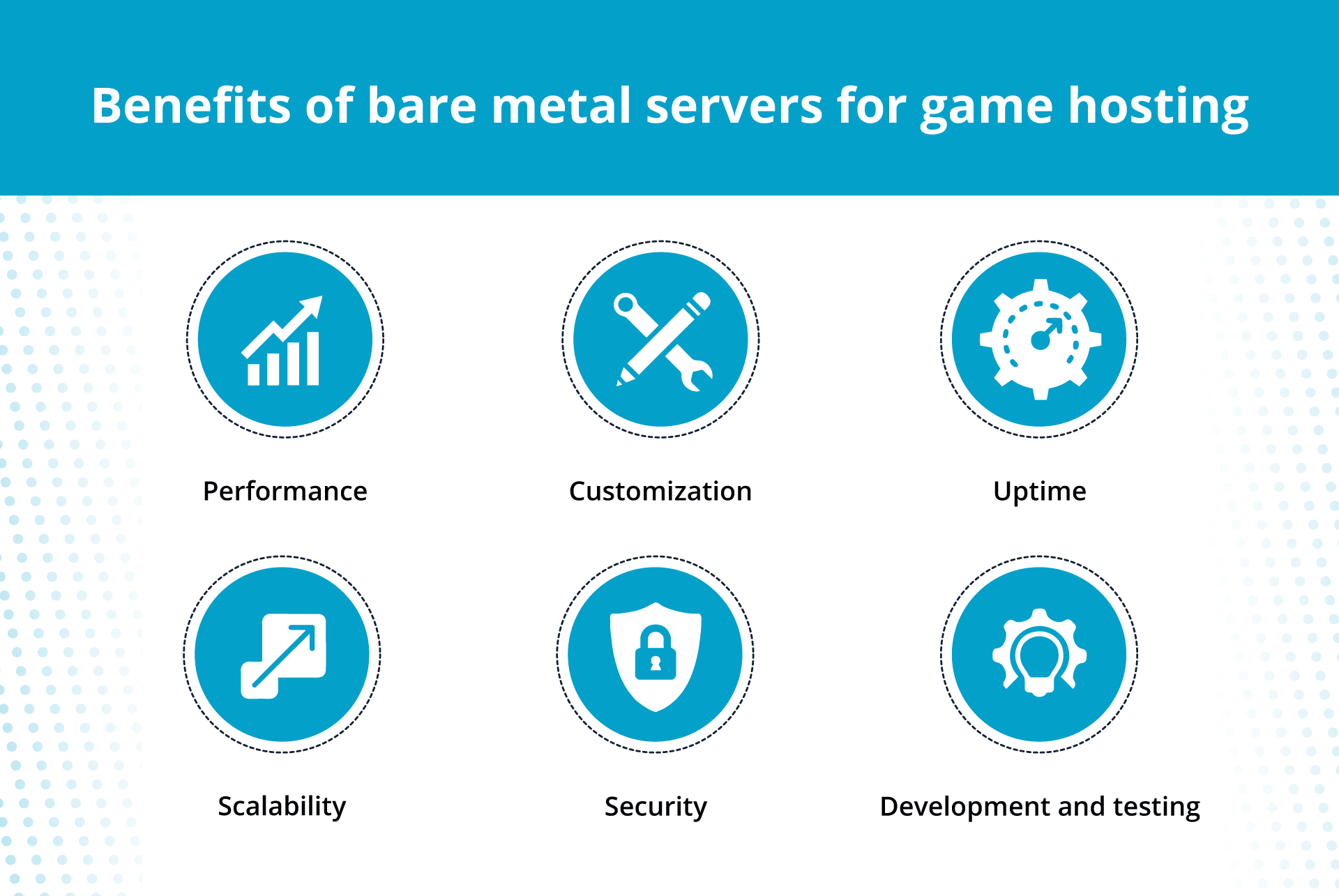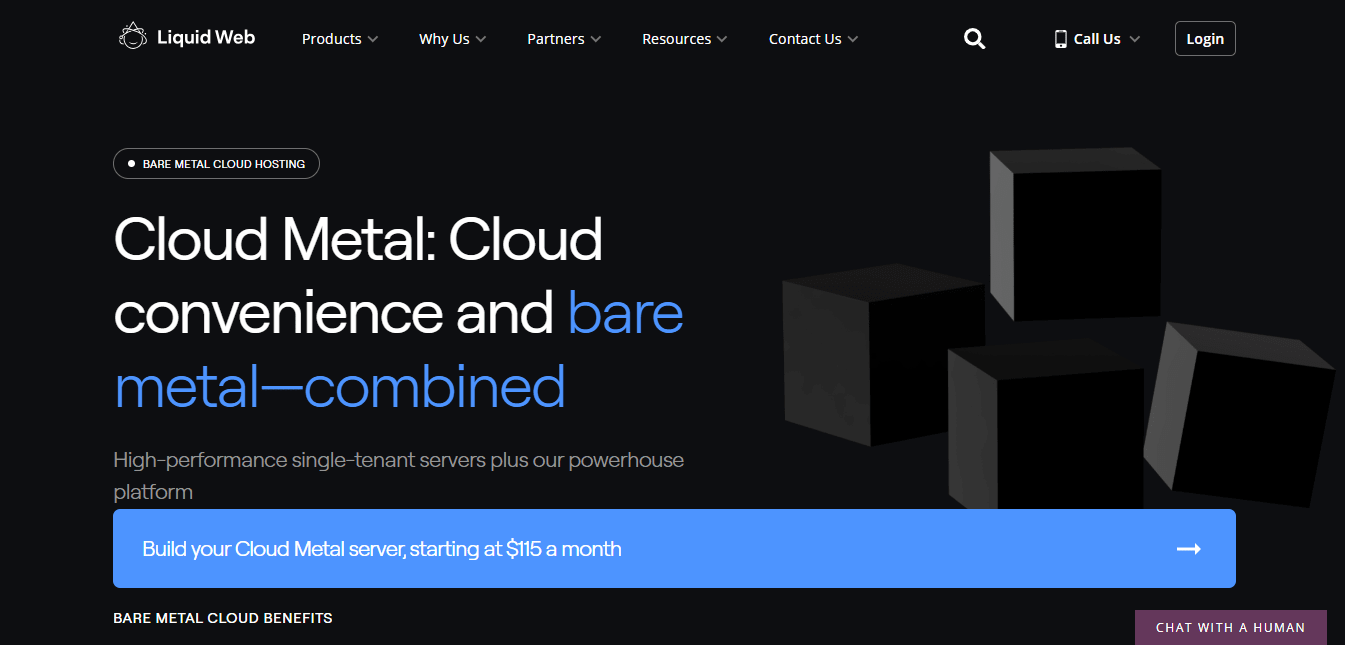Despite today’s economic uncertainty, the video game market shows no sign of slowing down. According to Statista Market Insights, the gaming market will reach $282.30 billion in 2024. And by 2027, this revenue is expected to grow to $363.20 billion.
But that doesn’t mean you can quickly produce a role-playing game (RPG) with poor gameplay and get a slice of the action. To outsmart competitors and deliver a top-class gaming experience, you need to use every resource at your disposal, including game hosting.
For high-performance games with complex resource requirements, consider enterprise-level hosting options, like dedicated bare metal server hosting.
Read on to find out what bare metal game servers are and how they’re a win-win solution for developers and gamers.
Key points
- The use cases of bare metal hosting go beyond high-end web hosting.
- These are also powerful game servers that provide the control, performance, security, and customization levels developers desire.
- Gamers will also benefit from your bare metal server’s security and performance — they might even want their own bare metal servers for playing certain games.
Here’s what we’ll cover:
What is game server hosting?
Like websites and databases, video games require hosting solutions, such as a server or cluster of servers. That’s where game server hosting comes in.
A game server is a physical or virtual server that is the central hub for all the actions and processes of a multiplayer online game. During gameplay, a player’s device constantly interacts with the game server to update their game state.
For example, when a player completes an in-game action, their device automatically sends data to the game server, which transmits data to them in real time.
The two common types of game hosting are peer-to-peer (P2P) hosting and client-server hosting.
P2P hosting
In this hosting format, players connect to each other’s machines, so no central dedicated server is required. P2P hosting works best for small games in which players are in close geographical proximity.
In P2P hosting, when a group of gamers are playing together, the game’s performance depends on the resources of a single gamer’s server. If the server has a poor connection, all players can suffer lagging and other issues.
This affects the gaming experience, which could make players switch to another game. To provide a better experience for gamers, consider client-server hosting.
Client-server hosting
In client-server hosting, the main host, such as the game developer, manages the resource needs of game players. This setup involves a central dedicated server that acts as the main hub for processing game data and facilitating communication between players’ devices. This type of hosting is ideal for large-scale games, and it lets developers leverage centralized control, scalability, and reliability while achieving low latency. This is useful in allowing developers to ensure consistency and maintain functionality on the backend of their games.
A bare metal server is a physical computer server dedicated to one customer alone. This customer, whether a blogger, online retailer, gamer, or game developer, gets full use of the server’s hardware resources, such as CPU cores and RAM.
Bare metal hosting is a step up from shared and VPS hosting, as it offers greater control, superior performance, and improved resource allocation.
Due to some similarities, the term “bare metal hosting” is often used interchangeably with “dedicated hosting,” another single-tenant option.
But bare metal servers differ from dedicated servers in a few ways. Bare metal servers are highly customizable, and they are associated with faster provisioning and easier scaling.
With bare metal servers, you usually have a wide choice of server setup and hardware, including:
- Data center location (e.g., Europe or the U.S.).
- Operating system type (e.g., Ubuntu, Linux, or Windows).
- Processing power (e.g., GPU and CPU).
- Storage (e.g., SSD).
To differentiate bare metal servers from standard dedicated hosting, some bare metal service providers offer better hardware specs and added cloud benefits. This makes bare metal server hosting a top-of-the-line solution that meets the requirements of various customers, including game developers.
As the gaming landscape continues to evolve, both gamers and developers need a bare metal game server to optimize the gaming experience. Let’s explore how.
Gamers
Some games allow players to host their own private or virtual servers, which gives them ample computing resources, ensuring smooth gameplay even when playing multiplayer games. One example of such a game is the wildly popular Fortnite, which had half a billion players in 2023.
Gamers might want a dedicated, bare metal game server for various reasons, such as community management, control, and security.
If you have the technical skills, you might want to build your own game server to get the most from games like Minecraft and Counter-Strike. This gives you complete control over your server environment but will take time and effort, as it involves several steps and configurations.
Game developers
Game developers primarily need somewhere to host their games. Depending on the type of game developed, there may be some advantages to having a bare metal server for game hosting.
- Direct access to the server environment.
- The absence of noisy neighbors.
- Opportunities for game monetization.
To decide whether or not a bare metal server is the best fit for your gaming needs, let’s explore its benefits in detail.
Whether you’re new to indie game development or you run a game studio with some successful releases under your belt, you’ll benefit from a bare metal server. And you don’t need to start off with the maximum resources (e.g., RAM and processors) available.
Here’s what a bare metal game server can bring to your next project:

Performance
Along with cloud servers, bare metal servers are high-performance options that will set your game apart from slower competitors. That’s because server resources, such as CPU, storage, and RAM, are optimized for your workload and dedicated to your game.
Here are two aspects in which bare metal game servers enhance performance:
Latency: Also known as ping, latency in gaming is the delay between a player’s actions and a game’s response. Today’s speed-sensitive gamers demand quick game responses. This means delayed game response could reduce performance levels and deliver a frustrating gaming experience.
With bare metal hosting, all server resources are dedicated to a single tenant. This improves performance and reduces latency, ultimately enhancing gameplay.
Bandwidth: Generally expressed as bits per second (bps), bandwidth is the rate of data transfer across a given path. If you choose a bare metal server for gaming, you’ll be able to optimize your bandwidth by using enterprise-grade network hardware.
As any experienced online gamer will tell you, good bandwidth is essential for fast-paced, data-intensive games.
Without sufficient bandwidth, gamers might experience:
- Unsatisfactory load times.
- Low streaming quality.
- Choppy gameplay.
Customization
Bare metal servers provide a high level of customization for game developer workloads, which differ from standard web hosting and database hosting.
While dedicated hosting providers may offer a few different plans, many bare metal hosting providers offer a wide range of server configuration choices.
For example, some bare metal server providers allow you to choose your operating system, control panel, server location, and other specifications.
This way, you can select a data center location that’s close to most of your players and get the hardware specs (e.g., Intel processor) that suit your game.
Uptime
Gamers expect their favorite games to always be accessible. For this reason, a shared server won’t cut it for most online games.
If your game is just starting to gain popularity, the last thing you want is downtime because some noisy neighbor has maxed out a server’s capacity. Gamers might think the fault lies within the game itself, giving your company a negative reputation.
Some hosts, like Liquid Web, have 100% uptime service-level agreements (SLAs), giving you peace of mind that gamers can always access your games.
Scalability
If you expect your game to steadily grow in popularity or you’ve already reached your current resource limit, you’ll want a hosting plan that allows you to upgrade server resources as needed.
In many cases, bare metal servers have superior scalability to standard dedicated servers. Liquid Web’s Cloud Metal offers easy scaling and lets you leverage the benefits of both cloud and bare metal hosting.

Security
Maximum security is important to both game developers and gamers.
- Protect their personal information (e.g., ID number and credit card details).
- Protect their gaming devices from malware and DDoS attacks.
- Play fair games where cheating is minimized.
- Secure their game achievements and rewards.
On the other hand, game developers want secure, dedicated resources to protect themselves and gamers.
Depending on the type of game and its available locations, you might need to uphold data protection laws like the General Data Protection Regulation (GDPR).
You’ll also want a safe environment to store sensitive game data, ensuring your intellectual property isn’t stolen by another developer.
You should be able to add extra layers of security to your bare metal game server and restrict its use to only authorized players. Furthermore, you can leverage private networking to tighten game security.
Some bare metal hosting services include robust security features (e.g., DDoS protection) as standard, ensuring uninterrupted gameplay without worrying about security threats.
Development and testing
Developers can create virtual machines to isolate different game projects, such as new games and updated versions of an existing game.
If you use a hypervisor to create separate virtual machines for development, testing, and live gameplay, you can keep your game running while working on new projects.
To ensure full availability and zero downtime, you might want to consider adding the benefits of cloud computing to your game server setup.
With Liquid Web, you can choose bare metal cloud, dedicated cloud, or even enterprise-grade private cloud powered by VMware.

Bare metal hosting is generally geared toward users who can handle server management themselves. So, if you decide to get a bare metal server for your game development company, ensure you — or your IT team — have enough resources to manage it.
If you want fully managed hosting with on-demand resources, consider Liquid Web’s managed services. We offer various cloud and dedicated server plans to meet your game hosting needs. Plus, you’ll get 24/7 support from our team of experts.
To find out which game server is ideal for you, contact our support team today.

